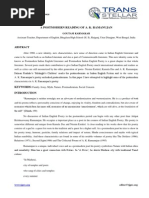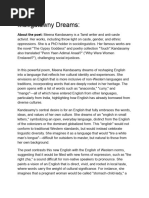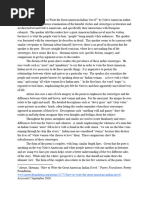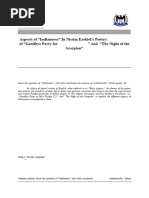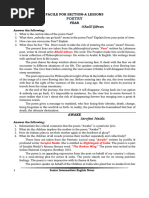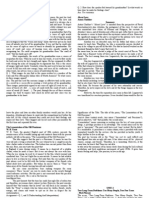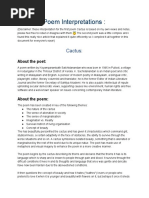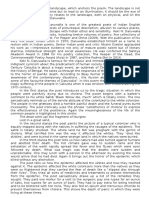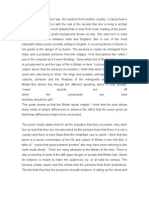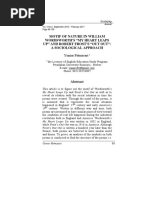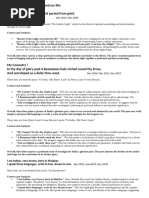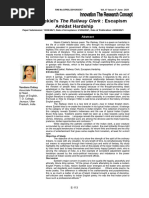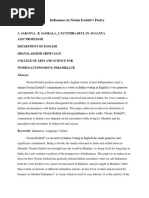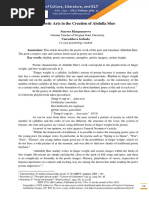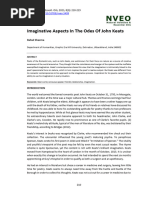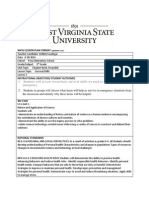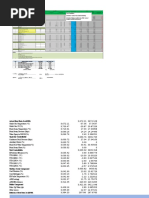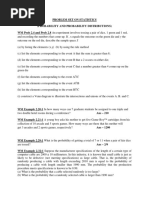International Journal of Scientific Research and Reviews
International Journal of Scientific Research and Reviews
Uploaded by
golu008055Copyright:
Available Formats
International Journal of Scientific Research and Reviews
International Journal of Scientific Research and Reviews
Uploaded by
golu008055Original Title
Copyright
Available Formats
Share this document
Did you find this document useful?
Is this content inappropriate?
Copyright:
Available Formats
International Journal of Scientific Research and Reviews
International Journal of Scientific Research and Reviews
Uploaded by
golu008055Copyright:
Available Formats
D.
Vijayaraghavan et al, IJSRR 2019, 8(1), 295-299
Research article Available online www.ijsrr.org ISSN: 2279–0543
International Journal of Scientific Research and Reviews
“Sarcastic and Strong Approaches on Social Elements in Nissim
Ezekiel’s Poetry”
D. Vijayaraghavan
Associate Professor of English AJK College of Arts and Science Navkkarai, Coimbatore, Tamil
Nadu, India. Email: vijayambi.thatsv@gmail.com
ABSTRACT:
The poems of Nissim Ezekiel mostly deal with the social elements that he happened to
approach at his life time. Though brought up in India as an Anglo-Indian poet, his approaches on
the Indian soil about India is very much original and mostly reflects its originality. The poems of
Nissim Ezekiel prove something different from other poets. As it has been written in the Holy
Bible,“He that rebuketh a man afterwards shall find more favour than he that flattereth with the
tongue” [Proverb 28:23]
His works are appreciated and apt for the sentence above mentioned. To make the reader
enjoy and at the same time be pierced in thoughts and be provoked against the present circumstances
that lead a hypocritic society as an acceptable one among the many, it has been clearly exposed in
each of his poems. As a well wisher of the social welfare his poems stand as an indirect moral and
can be even called poems of morality.He gave anew thought and a new outlook to Indian English
Poetry and is universally recognized and appreciated as being one of the most notable and
accomplished Indian English language poets of the 20th century.The present paper analyses the
Sarcastic and strong approaches on social elementsin the poems of Nissim Ezekiel.
KEYWORDS: Nissim Ezekiel, Poems, India, Woman, Beautiful
*Corresponding author
Dr. D. Vijayaraghavan
Associate Professor of English
AJK College of Arts and Science
Navkkarai, Coimbatore
Email: vijayambi.thatsv@gmail.com
IJSRR, 8(1) Jan. – Mar., 2019 Page 295
D. Vijayaraghavan et al, IJSRR 2019, 8(1), 295-299
INTRODUCTION:
Nissim Ezekiel born in Bombay in 1924 to Jewish parents, grew up in the metropolis loving
its streets and crowds, and yet, finding his solitary space for poetry. He had an excellent academic
record, winning the R.K. Lagu Prize for holding the first rank in M.A English Literature from
Bombay University in 1947. From late 1948 to 1952, he lived in England studying theatre, cinema,
psychology, philosophy and even modern Indian culture. In the meanwhile, he steadily wrote
poems, and by the time he left England, his first collection of poems, “A Time to Change”, had
come out in 1952. He pursued various professions like literary journalism, advertising, broadcasting
and teaching. For some time, he was an editorial staff of The Illustrated Weekly of India. In
1953, his second collection, Sixty Poems, came out. When Quest, the pre-eminent literary journal
was founded in 1954, he became its first editor.
In his inaugural address at the PUCL National Convention held in Bombay on October 31 and
November 1, 1992, his words on societal consideration are noteworthy:
“Activists will have to think of remedies …. Activists always have to think of remedies, but
the editor I am quoting adds without demolishing the walls lock, stock and barrel, respect for rights
and liberties will remain a distant goal”. This is followed by the last sentence of the address.
Nothing short of a philosophical revolution can bring about a change, and for that we need to have
iconoclasts, not status-quoits and constitutional experts.
In the poem Healers – in the opening line, ‘The unplanned city has a death-wish;’ he clearly points
out his feelings on the society that has never had a moral for their lives. Their effects of incantations
are revealed as, “Their incantations hang in the polluted air” where the surrounding lacks its
originality the inhabitants of the same can never be made whole or perfect. The one who likes to
come out of such evils should never be desired to settle down in the same. Also in the following
line, “Sex is prohibited or allowed Meat and drinks are prohibited or allowed” reveals the realism of
the exposed falseism. The outer man walks among the grouped society and it shows himself or
herself as the perfect nature and embodiment of the real human but the inner one likes to be mingled
with the evils and the unwanted. These pretensions of the mob are strongly condemned by the poet.
Their outward morality is sarcastically attacked in the next line: “………………. Give up everything
or nothing and be saved” Even the system of social behaviour in marriages is indirectly attacked by
the poet. “It does not matter if your marriage is arranged. It does not matter if you cannot love your
wife.”
The word ‘arranged’ and the phrase ‘cannot love your wife’ expose the systems of society
that often opposing the real will and wish of the individual and that has hurt on the soft inner man.
Even though the desires are left behind, the systems teach them to live a life pretending as a family
IJSRR, 8(1) Jan. – Mar., 2019 Page 296
D. Vijayaraghavan et al, IJSRR 2019, 8(1), 295-299
and make the public to approve and the government to proclaim them as the pair meant to live as
husband and wife bound by the law and the society but not by the mind or love. These strong
approaches of the poet reveal his real being and the greatest desire for the longing of good being.
Even the same point is expressed in the poem ‘Minority’. He says: “It’s not the mythology Or the
marriage customs that you need to know”
Though the poet’s view of the lines deals with the life of a saint, the words related to the
marriage is compared with the mythology and equated to that meaning that reveals that they are just
the imaginative and never bring a piece of bread to the satisfaction of man’s life.
When he talks about his own marriage ceremony in “Jewish Wedding in Bombay”, “………
mostly, we were Amazed, and so were the others, Who knows how much belief we had?” In the
lines “……….. The game delighted all then eighbour’s children, who never stopped staring at me,
the reluctant bridegroom of the day” hepolishly explains how the position of a bridegroom would be
on the day of wedding as each and everything deals plainly with rituals. But the real love lies, he
says, in “Aside”. One cannot imagine Elephants making love, But it seems they do. So also tortoises
And snails, Or even other men With women doing What it seems they do. No, one cannot imagine it,
Except as a song In which we the lovers Are sung and saved From too much separation Love is the
ultimate reparation.
In “Hang Over”, when the poet talks about the family system, his sarcastic talent is clearly
expressed through his comparison. “Five-child local family staring at one-child American family”.
His attack on Indian society extends to the highest level whenever he talks about the poverty that
rules the country even from time memorial.
Even when Ezekiel talks about select centered politics of the country, he never forgets to
point out the fate of poverty. “Long walk to Church gate between pavement sleepers” The great role
of poverty in Calcutta at where he witnessed a lot it’s role overflows in his poems. In the poem “In
India”, this can be clearly seen. “Always, in the sun’s eye, Here among the beggars, Hawkers,
pavement sleepers Hutment dwellers, slums,”
One can say that as the one witnessing the same every day; it has made a great impression in
the poet’s mind. The word ‘always’ strongly supports that point, whenever the poet starts his
thought to go around, he could travel only with these powerful figures. He says in his own sarcastic
way,
“Here among the beggars ………………….. ………………….. I ride my elephant of thoughts,
Ezekiel is not sarcastic when he talks in “Woman and Child” I stop when a child crawls on hands
and knees across our way. He’s beautiful, naked and funny. We smile at him, he’s amazed. His
mother, selling oranges seated by a wall, smiles at us. These lines express the condition of poverty
IJSRR, 8(1) Jan. – Mar., 2019 Page 297
D. Vijayaraghavan et al, IJSRR 2019, 8(1), 295-299
Ezekiel’s sarcasm and sound attack on poverty is clearly seen in the poem “From
Edinburgh Interlude” under the heading ‘Beauty and Poverty’: From the squalor of a narrow
lane leading to slum, she walked out – like one of the Maharaja’s air-hostesses. She stepped briskly
over pools of gutter-water and dog-shit. ……………. …………….. All I was left with was this
song about beauty and poverty. - Beauty and Poverty What lies special in the poems of Nissim
Ezekiel is the attachment on the public even himself when he happened to see them not heeding to
the cry and lamentation of the poor. It deals with the negligence of the society to uplift the down
trodden. It never lies in the words. When he talks in minority poem, he says, “It’s the language
really separates, whatever else is shared, on the other hand Everyone understands Mother Teresa; her
guests die visibly in her arms.”
It is the poets sentimental and sound attach on the person pining on poverty and needy just
through words.
In “Entertainment”, Ezekiel sympathetically expresses the idea that how the longing of the
down trodden and the forgettable of the public on their daily family running depend on others.
Nissim Ezekiel is explaining about the monkey-show done by a ‘patient girl’. Their trials and pains
are clearly depicted by the poet. The monkey-show is on: patient girl on haunches holds the strings,
a baby in her arms. Two tiny monkeys In red and purple pantaloons prepare to dance. Crown
collects, forms a circle. Naked to the waist, The Master pf Ceremonies Drums frenzy, cracks whip,
calls the tricks All those troubles continue just for their livelihood as it is explained in the line:
“to earn applause and copper coins” In the middle of the poem, the poet sarcastically mentions the
words: “……. The untouchable women Smooth their hair.” and strongly insists about the evil that
runs long in the society. The lines: “only the monkeys are sad, ………………. the baby begins to
cry Anticipating time for payment” clearly expose the conditions of the neglected. Their innermost
feelings are originally expressed in these lines: “Anticipating time for payment, the crowd dissolves.
Some in shame, part With the smallest coin they have.” pours the mournful events occurring in the
society. The final line: “The show moves on” is the one that expresses their continual life of
monotony without any spring in the life.
The society in general is very much induced by hypocratic and gloomy theories that spoil the
whole human community. The types of nature are strongly utilized by the poet by his sarcastic and
strong expressions. In ‘In India’, he talks about the religious hypocracy that runs among the public.
Though to the outer world they pretend themselves perfect and noteworthy, their inner life and their
personal thoughts stink and produces bad odour.
IJSRR, 8(1) Jan. – Mar., 2019 Page 298
D. Vijayaraghavan et al, IJSRR 2019, 8(1), 295-299
REFERENCES:
1. Ezekiel Nissim. Collected Poems 1952-1988). New Delhi: Oxford University Press,
1989.
2. PeeradinaSaleem. Contemporary Indian Poetry in English An Assessment and
Selection. Madras: S.G. Wasani for Macmillan India Ltd.
3. Ramamurti K.S. Twenty-five Indian Poets in English. Madras : S.G. Mukherji
for Macmillan India Ltd., 1995.
4. Dr. Sathishkumar and TayalAnupama. Selected Poems. Agra : Lakshmi Narain
Agarwal.
5. Abrams M.H. A Glossary of Literary Terms. Madras : S.G. Wasani for
Macmillan India Ltd., 1991.
IJSRR, 8(1) Jan. – Mar., 2019 Page 299
You might also like
- Readings On Indian Literatures NotesDocument39 pagesReadings On Indian Literatures NotesSTATUS SAVER75% (8)
- Degree 2nd Sem ENGLISH - COLOURDocument15 pagesDegree 2nd Sem ENGLISH - COLOURSlns AcptNo ratings yet
- Striders A Poem by RamanujanDocument5 pagesStriders A Poem by Ramanujankaviyky100% (4)
- 11 Conclusion PDFDocument10 pages11 Conclusion PDFDurgawati GuptaNo ratings yet
- English 2nd year single answersDocument10 pagesEnglish 2nd year single answersmohabeNo ratings yet
- Ezekiel's Contribution To PoetryDocument8 pagesEzekiel's Contribution To PoetrySmrithika RongaliNo ratings yet
- Indianness in The Poetry of Nissim EzekDocument4 pagesIndianness in The Poetry of Nissim EzekHasan SkNo ratings yet
- Plus One English Lesson SUMMARIESDocument16 pagesPlus One English Lesson SUMMARIESanoopms200044% (9)
- English - IJEL - A Postmodern Reading of A.k.ramanujan - Goutam KarmakarDocument10 pagesEnglish - IJEL - A Postmodern Reading of A.k.ramanujan - Goutam KarmakarTJPRC PublicationsNo ratings yet
- Santosh Kanwar Shekhawat Assistant Professor Department of English Maharaja Ganga Singh University BikanerDocument12 pagesSantosh Kanwar Shekhawat Assistant Professor Department of English Maharaja Ganga Singh University BikanerAbhinayaa SharmaNo ratings yet
- Activity 1Document2 pagesActivity 1Gel Velasquezcauzon0% (1)
- Elements of Indian Ness in Jayanta MahapatraDocument9 pagesElements of Indian Ness in Jayanta MahapatraBhawesh Kumar Jha50% (2)
- nisimDocument2 pagesnisimSweetie RanaNo ratings yet
- Summaries for first yearsDocument10 pagesSummaries for first yearsTarash JainNo ratings yet
- Nissim Ezekiel - An Approach and AnalysisDocument8 pagesNissim Ezekiel - An Approach and Analysism.senthilnathanNo ratings yet
- Ijll - The Truth To Poetics & The Concept of Beauty in The Idealism of John - ProofreadDocument10 pagesIjll - The Truth To Poetics & The Concept of Beauty in The Idealism of John - Proofreadiaset123No ratings yet
- "How to Write the Great Indian Novel" ExplicationDocument2 pages"How to Write the Great Indian Novel" ExplicationjebadenNo ratings yet
- YeatsDocument4 pagesYeatsEdna TricicNo ratings yet
- What Is LiteratureDocument9 pagesWhat Is LiteratureJade NisnisanNo ratings yet
- Hum - Diaspora Literature Voicing Concerns ThroughDocument8 pagesHum - Diaspora Literature Voicing Concerns ThroughImpact JournalsNo ratings yet
- Add Eng CIADocument4 pagesAdd Eng CIAkothari080903No ratings yet
- Indianess of the poemDocument4 pagesIndianess of the poemTaniya BandyopadhyayNo ratings yet
- Facile Section-A-Senior IntermediateDocument9 pagesFacile Section-A-Senior IntermediatesrilakshmivanijonnavithulaNo ratings yet
- Unit-I Grandmother Ray Young Bear About Love Anton ChekhovDocument13 pagesUnit-I Grandmother Ray Young Bear About Love Anton ChekhovPrakash Tarami MagarNo ratings yet
- Thangjam ibopishakDocument9 pagesThangjam ibopishakdikshavijay2004No ratings yet
- Indianness in Indian English PoetryDocument5 pagesIndianness in Indian English PoetryKaushik RayNo ratings yet
- Cactus Poem InterpretationsDocument6 pagesCactus Poem InterpretationsArlan JbNo ratings yet
- IN06Document10 pagesIN06123prayerNo ratings yet
- Amit Sir English Guru: Join The Best To Be The BestDocument8 pagesAmit Sir English Guru: Join The Best To Be The BestIndian ArmyNo ratings yet
- DaruwallaDocument2 pagesDaruwallaSourabh Agarwal100% (2)
- BFCBDocument4 pagesBFCBKim ShruNo ratings yet
- Exact Name Nissim PDFDocument7 pagesExact Name Nissim PDFG nah jg Cgj he xNo ratings yet
- Imtiaz DharkerDocument3 pagesImtiaz Dharkermoviemaniac92782033% (3)
- Poetic Iridiscence of Biplab MajumdarDocument8 pagesPoetic Iridiscence of Biplab MajumdarAnonymous o5fDfK8ZlNo ratings yet
- Junior All AnnotationsDocument13 pagesJunior All Annotationspranithavattikuti7No ratings yet
- The Criticism of Nissim EzekielDocument6 pagesThe Criticism of Nissim EzekielKaushik RayNo ratings yet
- The Poetry of Ajit BaruaDocument22 pagesThe Poetry of Ajit BaruaBISTIRNA BARUANo ratings yet
- Formalist TheoryDocument5 pagesFormalist Theoryalbertosehi1No ratings yet
- Vol 4+no 2 +Yuniar+Fatmasari,+86-105Document38 pagesVol 4+no 2 +Yuniar+Fatmasari,+86-105anton JayaNo ratings yet
- Post Colonial Features in Jayanta Mahapatra’s PoetryDocument4 pagesPost Colonial Features in Jayanta Mahapatra’s Poetryddbddb149No ratings yet
- 12 Chapter 8Document26 pages12 Chapter 8Meti Mallikarjun100% (1)
- English AssignmentDocument2 pagesEnglish AssignmentPunyak SatishNo ratings yet
- Beauty of thy LightDocument8 pagesBeauty of thy LightPramod KumarNo ratings yet
- Petre AndreevskiDocument12 pagesPetre AndreevskiIvan JovanoskiNo ratings yet
- R.K.Narayan ThemesDocument17 pagesR.K.Narayan ThemesabinayaNo ratings yet
- E002 Core 16 - South Asian Literature - VI SemDocument12 pagesE002 Core 16 - South Asian Literature - VI SemArthy DharanNo ratings yet
- Night of The ScorpionDocument2 pagesNight of The Scorpionarunbdh100% (2)
- 211219014218nissim Ezekiel’s the Railway Clerk _ Escapism Amidst Hardship.docxDocument4 pages211219014218nissim Ezekiel’s the Railway Clerk _ Escapism Amidst Hardship.docxsomulaha295No ratings yet
- Narvada Devi's Rocking Rock'Document5 pagesNarvada Devi's Rocking Rock'Dahal AtindraNo ratings yet
- 2 SemDocument10 pages2 SemMohammedshehbaaz 08No ratings yet
- MigrationsDocument5 pagesMigrationsNoel EmmanuelNo ratings yet
- Indianness in Nissim Ezekiel's PoetryDocument7 pagesIndianness in Nissim Ezekiel's PoetryKim ShruNo ratings yet
- What Is The Central Idea of The Poem The RainDocument3 pagesWhat Is The Central Idea of The Poem The RainYahya SaeedNo ratings yet
- Cultural Heritage and Spiritualism in The Poetry of A K RamanujanDocument8 pagesCultural Heritage and Spiritualism in The Poetry of A K RamanujanVenu MadanNo ratings yet
- Poetic Arts in The Creation of Abdulla SherDocument5 pagesPoetic Arts in The Creation of Abdulla SherAcademic JournalNo ratings yet
- Indian English 1Document225 pagesIndian English 1Sravan Reddy100% (1)
- Analysis 1 ActDocument3 pagesAnalysis 1 ActVaryNo ratings yet
- Imaganative Aspects of KeatsDocument10 pagesImaganative Aspects of KeatsdebogyannNo ratings yet
- Dayagel Seismic Test Report-july-August 2011Document9 pagesDayagel Seismic Test Report-july-August 2011Baye JunantoNo ratings yet
- Sample Question 2Document3 pagesSample Question 2Soumitra BhowmikNo ratings yet
- The Effect of Magnetic Field Treatment On The Characteristics and Yield of Iraqi Local White CheeseDocument7 pagesThe Effect of Magnetic Field Treatment On The Characteristics and Yield of Iraqi Local White CheeseIOSRjournalNo ratings yet
- 0422云途物流海外企业画册 (TH)Document18 pages0422云途物流海外企业画册 (TH)Khanh TranNo ratings yet
- (International Centre For Mechanical Sciences 140) T. Kailath (Auth.) - Lectures On Wiener and Kalman Filtering-Springer-Verlag Wien (1981) PDFDocument189 pages(International Centre For Mechanical Sciences 140) T. Kailath (Auth.) - Lectures On Wiener and Kalman Filtering-Springer-Verlag Wien (1981) PDFOzan AydınNo ratings yet
- CSF PaperDocument16 pagesCSF PaperDrRam Singh KambojNo ratings yet
- WCRR Functional Planning Review - Noise Report r3Document38 pagesWCRR Functional Planning Review - Noise Report r3Adrian FrantescuNo ratings yet
- 10th STD 2nd Language English Passing Package Target-50 2017-18 Santosh A NagaralliDocument59 pages10th STD 2nd Language English Passing Package Target-50 2017-18 Santosh A Nagarallisgshekar30100% (4)
- 2024 Midterm Exam. Global Culture in Tourism GeographyDocument2 pages2024 Midterm Exam. Global Culture in Tourism GeographyMaricar Pepito RellonNo ratings yet
- Leadership in Community DevelopmentDocument12 pagesLeadership in Community DevelopmentdaliaNo ratings yet
- IoT Software ArchitecturesDocument8 pagesIoT Software ArchitecturesThunder MNo ratings yet
- The Simplex Method: Standard Form of LPPDocument6 pagesThe Simplex Method: Standard Form of LPPSalma BarbaraNo ratings yet
- Lesson Plan 2Document6 pagesLesson Plan 2api-251585609100% (1)
- Dyestuff ENG LowDocument4 pagesDyestuff ENG LowSumeetpNo ratings yet
- NPHR Gap Analysis PJBS BabelDocument7 pagesNPHR Gap Analysis PJBS BabelsyalimonoNo ratings yet
- Youtube Trends Fandom Report 2024Document10 pagesYoutube Trends Fandom Report 2024gustavosantoosnxNo ratings yet
- Tutorial Ques - Cash BookDocument2 pagesTutorial Ques - Cash BookWan HoonNo ratings yet
- Product Catalogue: Hospital EquipmentDocument48 pagesProduct Catalogue: Hospital Equipmentyeahbaby!No ratings yet
- 0457 Global Perspectives: MARK SCHEME For The October/November 2013 SeriesDocument13 pages0457 Global Perspectives: MARK SCHEME For The October/November 2013 SeriesPranav PatchaNo ratings yet
- Past TenseDocument17 pagesPast TenseNur HafsaNo ratings yet
- CIEM 5390 Lecture Notes Set 6Document16 pagesCIEM 5390 Lecture Notes Set 6lastbald3No ratings yet
- Ecm5901 1Document8 pagesEcm5901 1Oscarito Vázquez100% (1)
- BBA - NEP 1st Year SyllabusDocument10 pagesBBA - NEP 1st Year SyllabusDivesh DuttNo ratings yet
- Electrical System Issue 7Document38 pagesElectrical System Issue 7Charl Pietersen100% (1)
- Allan WeissDocument7 pagesAllan WeissMukund RoyNo ratings yet
- PROBLEM SET 1 and 2 - 2 - 2 PDFDocument7 pagesPROBLEM SET 1 and 2 - 2 - 2 PDFMaharghya BiswasNo ratings yet
- 4.2 Use of Generic RCM Analyses: Operating Context: in Reality, Technically Identical Systems OftenDocument6 pages4.2 Use of Generic RCM Analyses: Operating Context: in Reality, Technically Identical Systems OftencontourmxNo ratings yet
- TRUMPF TruServices Brochure ENDocument36 pagesTRUMPF TruServices Brochure ENhieuNo ratings yet
- Building WorkDocument12 pagesBuilding Workthaonta3k17No ratings yet
- The Contributions of Female Existential Philosophers To PsychoterapyDocument14 pagesThe Contributions of Female Existential Philosophers To PsychoterapyAna Teresa MirandaNo ratings yet








